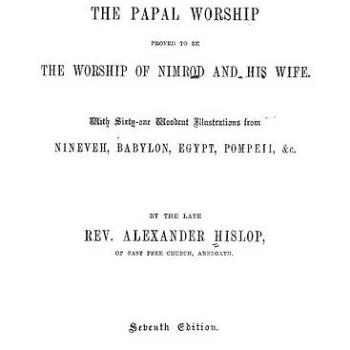Posthumous Portrait of Martin Luther as an Augustinian Monk (after 1546), from the workshop of Lucas Cranach the Elder (1472-1553) [public domain / Wikimedia Commons]
* * *
(8-27-11)
* * *
It’s simply amazing, the amount of misinformation, disinformation and propaganda anti-Catholics dish out. They make Baghdad Bob (remember that clown?) look like Abraham Lincoln. I would have thought that my previous copiously documented examination of this nonsense had laid to rest many of these bogus allegations.
Anti-Catholics are so used to lying about and distorting anything that Catholic apologists do that they literally could no sooner stop this than Niagara Falls could reverse its course.
Luther certainly did judge books of the Bible (which is technically a different notion from which books he left in his canon in his own Bible), solely on his own arbitrary, self-proclaimed, pseudo-prophetic “authority.” It’s not just us Catholics (oops, “Romanists”) who think this, but even some Lutherans and other Protestants: some of whom are troubled by Luther’s cavalier attitude towards the Bible.
I documented this almost seven years ago now, in my paper, “Luther’s Outrageous Assertions About Certain Biblical Books.” For example, non-Catholic Luther and “Reformation” scholar Preserved Smith wrote (this and other sources can be found in the aforementioned paper):
. . . few of his followers have ever interpreted, commented on, and criticized the Bible with the freedom habitual to him. The books he judged according as they appealed to his own subjective nature, . . .
Lutheran Mark F. Bartling (WELS), stated:
It must be admitted that Luther did develop a personal criterion of canonicity that took its place along side of apostolicity and universality (those books unanimously accepted by the early church, homologoumena) . . . It was, of all people, Carlstadt who condemned Luther for this criterion. Carlstadt said: “One must appeal either to known apostolic authorship or to universal historical acceptance as to the test of a book’s canonicity, not to internal doctrinal considerations.” [De Canonicis Scripturis libellus, Wittenberg, 1520, p. 50]. This position of Carlstadt was also the position of Martin Chemnitz and of C. F. W. Walther [Compendium Theologiae Positivae, Vol. I. p. 149].
Brooke Foss Westcott (1825-1901), the great biblical scholar, was equally direct in his disagreement with Luther:
No Church could rest on a theory which makes private feeling the supreme authority as to doctrine and the source of doctrine. As a natural consequence the later Lutherans abandoned the teaching of their great master on the written Word.
Moral of the story: when Catholics say things like I did, in this respect, we are not saying anything that many Protestant (including Lutheran) or secularist critics of Luther (Carlstadt, Chemnitz, Walther, Smith, Westcott et al) have not already said. But when we do it, it is supposedly bad research and “propaganda.” When a Protestant says the same thing, it is profound truth. Orwellian doublespeak . . . The Catholic is always wrong and the Protestant always right, even when they agree with each other. I agree: it makes no rational sense. Yet this is how anti-Catholic polemicists “reason.”
Now, when I first converted to Catholicism in 1991 and did some critical writing about Luther, I had at my disposal far fewer sources and resources than I have now. I wasn’t on the Internet yet (not for another five years, and six till I had my own website). I had one Catholic book about Luther of my own (the notorious, but not devil incarnate, Patrick O’Hare) and photocopies or handwritten notes from mostly two other early 20th century Catholic sources (Grisar and Janssen) from library research. Much of my earliest research utilizes these three sources. I also had Roland Bainton and some Protestant biographies of Luther as well. I had read Bainton’s famous Here I Stand in 1984.
My first paper on Luther dates from 1991. Needless to say, I have learned a great deal about Luther since that time (anyone can see how much I have written about him, including now a book) and have refined many of my opinions, as I learned more and more. I systematically purged virtually all references to O’Hare’s citations from my papers way back in 2002.
I have modified many opinions in particulars, about Luther. I continue to develop my beliefs about him on an ongoing basis, and remove old stuff. One of my old papers on the topic was entitled, Martin Luther: Beyond Mythology to Historical Fact. (the original URL can be traced on Internet Archive). The first version was dated 14 January 1991. There was a “5th Revised Edition” dated 11 November 2002. In the fifth edition, all the material on the biblical canon had been removed. The third edition of 18 January 2000 still contained it, without either attribution or URL. So did the fourth edition of 27 January 2002. But since November 2002, these quotes have not been on my website, in this paper.
The last time the paper was online, according to Internet Archive, was 11 October 2003, so it’s been gone almost eight years. Sometime between then and 6 December 2003 it was voluntarily removed as outdated (which is not the same as discredited) research. It never made it to my blog, because that was begun in 2004. When we look at the particulars anti-Catholics presents to make their case against a 20-year-old paper of mine, they uniformly fail to do so, since they all go back to Protestant sources, in terms of origin in English, and continued use.
Obviously, then, I was refining the paper as I learned more things. Most people would think that is a good and normal thing in legitimate research and inquiry (since all noted researchers and authors make revisions). In this ancient paper of mine, I cited O’Hare at length:
Of the Pentateuch he says: ‘We have no wish either to see or hear Moses. Job . . . is merely the argument of a fable . . . Ecclesiastes ought to have been more complete. There is too much incoherent matter in it . . . Solomon did not, therefore, write this book . . . The book of Esther I toss into the Elbe. I am such an enemy to the book of Esther that I wish it did not exist, for it Judaizes too much and has in it a great deal of heathenish naughtiness . . . The history of Jonah is so monstrous that it is absolutely incredible . . .
O’Hare was not the original source of these things (in English). I already documented in my previous paper that the source of this material in English (far as I could determine) was Sir William Hamilton: a Scottish Protestant philosopher, in 1834. He was utilizing and translating the standard edition of Luther’s Works in the18th century (the state of the art at that time): Johann Georg Walch (24 volumes: Halle: 1740-1753). Walch in turn cited the Aurifaber version of Table-Talk, dating from 1566.
Those three Protestant men are the originators of this material, not the Catholic O’Hare, who was writing in 1916 and utilizing the statements of Hamilton. Thus, O’Hare and other evil, wicked, wascally “Romanists cannot be uniquely blamed for this, as if it is poor research and a polemical motivation alone that caused them to pull things out of thin air in the effort to defame Martin Luther. It’s just not so. O’Hare wasn’t solely at fault. It wasn’t simply “propaganda.” It had a quite legitimate, scholarly Protestant textual history.
If O’Hare was a propagandist by using these words (and I myself by using his, which are Walch’s translated into English), then so were Hamilton and Walch and Aurifaber. But anti-Catholic critics merely want to bash O’Hare and the embodiment of evil and bad research, Dave Armstrong. O’Hare does indeed often engage in empty “anti-Luther” polemics and lousy research, which is why I don’t use him anymore, but this instance is not an example of it.
In the previous paper I already made a lengthy comparison of Hamilton’s section about Luther and the canon (translated from Walch, who cited Luther friend Aurifaber), and O’Hare’s. Here I’ll do it line-by-line (using O’Hare portions that I cited in my old Luther paper):
[Catholic] O’Hare, 1916: Job . . . is merely the argument of a fable . . .
[Protestant] Hamilton, 1834: Job spake not, therefore, as it stands written in his book, but hath had such cogitations . . . It is a sheer argumentum fabulae. . . .
[many Protestants (usually liberals who were biblical skeptics) picked this up — so we observe in a Google Books search — and noted that Luther regarded the book of Job as a fable or mere dramatic story without factual basis; see also a general Google search along these lines]
O’Hare, 1916: Ecclesiastes ought to have been more complete. There is too much incoherent matter in it . . . Solomon did not, therefore, write this book . . .
Hamilton, 1834: This book (Ecclesiastes) ought to have been more full; there is too much of broken matter in it; it has neither boots nor spurs, but rides only in socks, as I myself when in the cloister . . . Solomon hath not therefore written this bookO’Hare, 1916: The book of Esther I toss into the Elbe. I am such an enemy to the book of Esther that I wish it did not exist, for it Judaizes too much and has in it a great deal of heathenish naughtiness . . .
Hamilton, 1834: The book of Esther, I toss into the Elbe.” [Ib.] [“And when the Doctor was correcting the second book of Maccabees, he said: –] . . . I am so an enemy to the book of Esther, that I would it did not exist; for it Judaizes too much, and hath in it a great deal of heathenish naughtiness.O’Hare, 1916: The history of Jonah is so monstrous that it is absolutely incredible . . .
Hamilton, 1834: The history of Jonah is so monstrous, that it is absolutely incredible.
[a Google Books search of this phrase reveals that many Protestants cited it throughout the 19th century: several noting that it came from the Protestant Hamilton. It was in common use before O’Hare was even born]
It wasn’t only the Catholic O’Hare citing or paraphrasing these sections from Hamilton: not by a long shot. I have linked above to examples found in Google Books searches. Secularist Luther scholar Preserved Smith also did, just five years before O’Hare:
. . . he declared Job to be an allegory; Jonah was so childish that he was almost inclined to laugh at it; the books of Kings were “a thousand paces ahead of Chronicles and more to be believed.” “Ecclesiastes has neither boots nor spurs, but rides in socks, as I did when I was in the cloister.”
(The Life and Letters of Martin Luther, Boston: Houghton Mifflin Company, 1911, 268)
The only section that couldn’t be traced back to Hamilton was “We have no wish either to see or hear Moses.” Very well, then; I did a search on Google Books. Not much turned up. All O’Hare stated was, “Of the Pentateuch he says: ‘We have no wish either to see or hear Moses.'” I agree that this is inadequate, because it has no context at all and could easily be misinterpreted (especially knowing Luther and his frequent rhetorical exaggerations and oft-used sarcastic, non-literal mode of argumentation). On the other hand, O’Hare has not interpreted it himself. In any event, the words themselves do exist in Luther, and in that sense, this is not “propaganda” per se, but the reporting of a fact.
Now then, let us get to the bottom of it all and say that these teachers of sin and Mosaic prophets are not to confuse us with Moses. We don’t want to see or hear Moses. How do you like that, my dear rebels? We say further, that all such Mosaic teachers deny the gospel, banish Christ, and annul the whole New Testament. I now speak as a Christian for Christians. For Moses is given to the Jewish people alone, and does not concern us Gentiles and Christians. We have our gospel and New Testament. If they can prove from them that images must be put away, we will gladly follow them. If they, however, through Moses would make us Jews, we will not endure it.
(Luther’s Works, Vol. 40, p. 92)
But this dates from after 1955, and wasn’t available to O’Hare. Moreover, in Luther Vindicated by Charles Hastings Collette, the author provides extensive context. He states:
There is a passage quoted by Dr. McCave, as reported in his Lecture in The Midland Counties Express, as follows :—”It was Luther who said of the Pentateuch ‘We neither wish to see nor hear this Moses; he is master of all hangmen, and no one can surpass him when there is a question of terrifying, torturing, or tyrannizing.’ ” I have utterly failed to trace this passage.
Collette’s book was published in 1884, and he was a Protestant. This could very well be O’Hare’s source (the reference to “the Pentateuch” strongly suggests it), in which case again it is a matter of O’Hare citing a Protestant, who is not hostile to Luther at all; a book, in fact, where he is expressly defended. “Dr. McCave” appears to be Canon James McCave, D.D.: a Catholic; Collette is not necessarily agreeing with what he cited, and couldn’t trace it. Thus we have:
[Catholic] O’Hare, 1916: Of the Pentateuch he says: ‘We have no wish either to see or hear Moses.’
[Protestant] Collette, 1884 (citing Catholic McCave): It was Luther who said of the Pentateuch ‘We neither wish to see nor hear this Moses . . .’
According to Walch, Luther thought the book of Job was a “fable.” This came right from him, as Hamilton stated. According to Preserved Smith (writing in 1911), he thought it was “allegory.”
O’Hare drew directly from the Protestant Hamilton, who translated into English the official Luther compiler Walch, who included Table-Talk from Luther contemporary and personal secretary Aurifaber. This is O’Hare’s fault that he dared to trust Protestants for accurately reporting the words of their hero Luther? And it’s our fault for citing him, doing so? As if anti-Catholics have never utilized older pro-Luther research (they do all the time) and in so doing, trusted it implicitly for accuracy?
Isn’t Catholic apologetics fun? This is the sort of garbage we hear from our anti-Catholic intellectual giants on a weekly, sometimes daily, basis: pathetic tactics from historically-challenged fools who are unable to rationally defend their viewpoints.
***


















